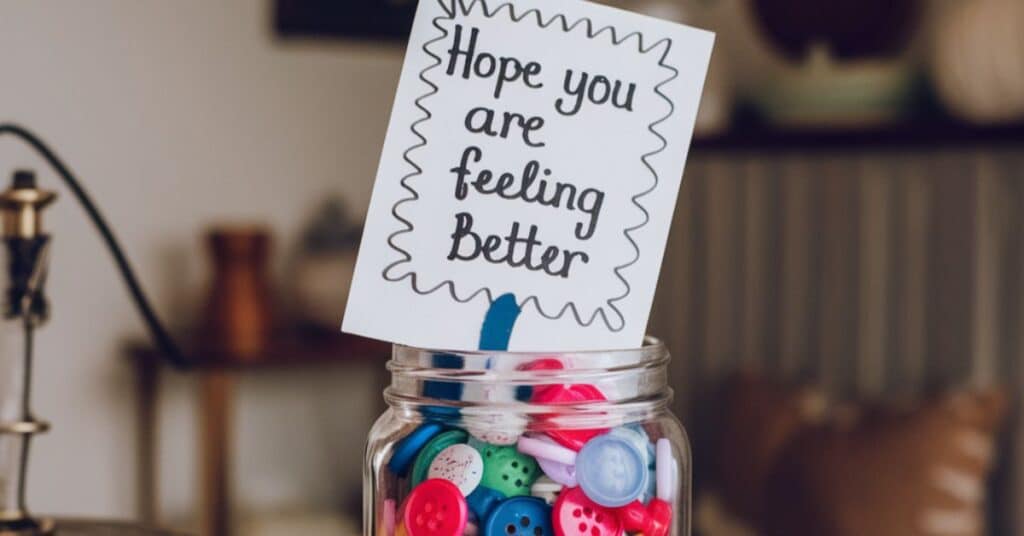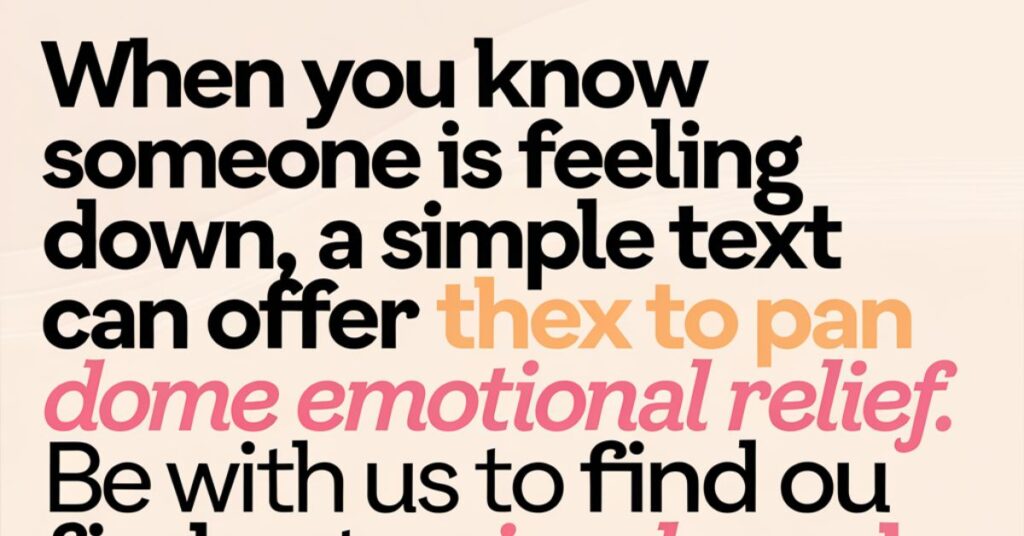When someone you care about is feeling unwell, whether physically or emotionally, it’s natural to want to send them a message of comfort and positivity. A simple “Hope you are feeling better” can convey your concern, but adding a personal touch and sending positive thoughts can brighten your day. From my own experiences, I’ve learned that it’s not just about what you say, but how you say it that can make all the difference.
Sending positive thoughts doesn’t need to be elaborate. Sometimes, it’s the small gestures and thoughtful words that resonate most.
Sending a heartfelt message, a phone call, or even a small gift, letting someone know they’re in your thoughts can offer them some emotional relief. Be with us to find out a simple and lovely text to someone you care about.
Creative Messages to Say:

A simple phrase like “Hope you are feeling better” can be enhanced by expressing that you are thinking of them and sending them good energy. Something like, “Wishing you strength and comfort as you get better” can make the message feel more meaningful,
Here are more creative ideas for saying hope you are feeling better:
“I know things are tough, but hang in there—better days are coming!”
A positive reminder that brighter days are ahead, giving them hope.
“I hope today is treating you gently and you find moments of peace.”
A gentle way to send positive energy, acknowledging they may still be going through a tough time.
“Just a reminder: you’re stronger than you think. Take it easy, and feel better soon.”
A confidence boost to help them remember their resilience.
“Rest up and know you’ve got people cheering for you to feel better!”
A lovely reminder they’re not alone and have a support system.
“Hoping you’re on the road to recovery. If you need anything, I’m here for you.”
Offering help, showing you care and are ready to support them in practical ways.
“Thinking of you and hoping each day brings a little more relief.”
A message of gentle encouragement for someone with a longer recovery process.
“Take all the time you need to rest and recover—sending you healing thoughts!”
Reassures them that it’s okay to take time to heal without pressure.
“Here’s hoping tomorrow is better than today. Sending lots of love and strength your way.”
Offering hope for a better day without dismissing their current feelings.
“Wishing you all the relaxation you deserve—hope you’re back to yourself soon!”
Encouraging them to take the break they need without feeling guilty about it.
These messages are heartfelt, simple, and let the person know that you genuinely care about their well-being.
How to Make Someone Feel Better
knowing how to make someone feel better isn’t always straightforward. Over the years, I’ve realized that the best way to comfort someone often depends on the situation and their personality.

Even so, there are some universal things you can do to show care and offer support. Here are a few strategies that I’ve found to be effective in helping someone feel better.
1. Listen Without Judgment
One of the simplest yet most powerful things you can do is to be a good listener. Often, people don’t need advice, they just want to vent or share their feelings with someone who will listen without trying to “fix” things. I’ve learned that offering a non-judgmental space where they can express how they’re feeling helps them feel understood and supported. Just being there can make a huge difference.
2. Offer Emotional Support
A little bit of empathy goes a long way. Simple words like “I’m here for you” or “You’re not alone in this” can provide comfort. I’ve found that showing empathy without minimizing their feelings is key. Saying something like “I can’t imagine how hard this is for you, but I’m here if you need anything” acknowledges their pain while still offering support.
3. Send a Thoughtful Message or Note
If you can’t be with them in person, a thoughtful message can brighten their day. Whether it’s a simple “Thinking of you” or something more detailed like “I hope today is a little kinder to you,” it shows that you’re keeping them in your thoughts. I’ve even sent handwritten notes before—it adds a personal touch that can mean a lot, especially when everything feels overwhelming.
4. Do Something Kind
Actions often speak louder than words. Whether it’s bringing them their favorite snack, offering to run errands, or surprising them with a little gift, small gestures can go a long way in making someone feel better. I’ve learned that people don’t always ask for help, so offering specific things like “I can pick up groceries for you” or “I’ll watch the kids for a while” can make it easier for them to accept your help.
5. Help Them Focus on Self-Care
Sometimes, people need a gentle reminder to take care of themselves. Encouraging them to rest, eat well, or take a break from their responsibilities can help them recharge. I’ve noticed that when people are feeling stressed or sick, they often push themselves too hard. Saying something like, “It’s okay to take it easy, you deserve to rest,” can permit them to slow down without guilt.
6. Share Something Uplifting
When someone’s feeling low, a small dose of positivity can help brighten their mood. I like to share funny videos, uplifting quotes, or stories that can bring a smile to their face. It doesn’t have to be anything big, sometimes just a little distraction can help take their mind off things, even if it’s only for a moment.
7. Remind Them It’s Okay to Feel How They Feel
Sometimes people need validation more than anything else. When someone is feeling sad, anxious, or frustrated, it’s easy for them to think they’re being “too much” or “overreacting.” I’ve found that telling them, “It’s okay to feel this way, what you’re going through is tough,” can be a huge relief. It lets them know their feelings are valid, which can help ease some of the emotional burden.
Also Read This Blog: Traveler or Traveller Correct Spelling and examples
The Importance of Timing and Sensitivity
While it’s wonderful to send positive thoughts, it’s also important to be mindful of timing and how the recipient may be feeling. If they are dealing with something particularly challenging, they may not respond right away. They might need space or time before they feel up to replying, and that’s perfectly okay.
This and not expecting an immediate reply shows that your gesture is genuine and that you’re giving them the room they need. Sometimes, just knowing that someone is thinking about them can bring comfort, even if they’re not ready to engage.
How to Respond to “I Hope You Feel Better”
When someone takes the time to send a message like “I hope you feel better,” it’s thoughtful and kind, so responding with gratitude and appreciation is always a good idea. Depending on how you’re feeling or your relationship with the person, your response can be simple or more detailed. Here are a few ways to reply:
- Simple and Grateful Responses:
- “Thank you! I appreciate your kind words.”
- “Thanks so much, that means a lot.”
- “Thank you for thinking of me!”
- “I appreciate your well wishes.”
- More Personal Responses:
- “Thanks for your kind words. I’m trying to rest and recover.”
- “I appreciate your message—it made my day.”
- “Thank you! I’m feeling a little better today, and your message cheered me up.”
- “Thanks for checking in, it’s nice to know someone cares.”
- If You Need Support:
- “Thank you, I’m having a rough time, but your message helps.”
- “I appreciate your kind words. I’m still struggling a bit, but it means a lot to hear from you.”
Conclusion: hope you are feeling better
In life, we all experience moments of difficulty, and it’s during these times that the support of others can make all the difference. A simple phrase like “I hope you are feeling better” carries a lot of weight, offering both comfort and encouragement.
By adding a personal touch, offering acts of kindness, and being sensitive to the recipient’s needs, your message can go even further. Even so, it’s a heartfelt note or a small gesture, showing someone that you care can truly help them on their journey to feeling better. And give them some time to be better without any expectations of reply because they are in a bad phase now.
So, the next time someone you know is going through a hard time, don’t hesitate to send them your positive thoughts and well-wishes, it might be just what they need.

“Robert Henry is an experienced blogger with a passion for language and education. His insightful posts on Vocab Scope offer readers valuable tips on vocabulary and grammar. With a background in linguistics and a knack for clear, engaging writing, Robert is dedicated to helping others enhance their communication skills.”






